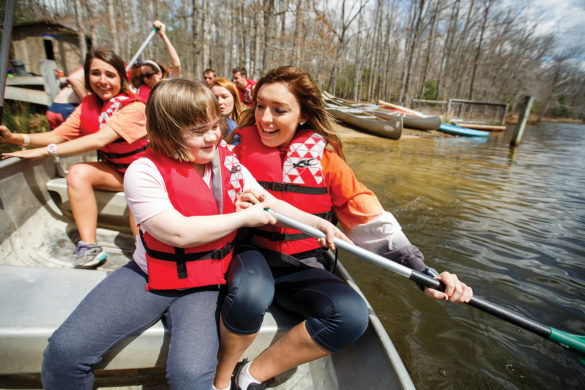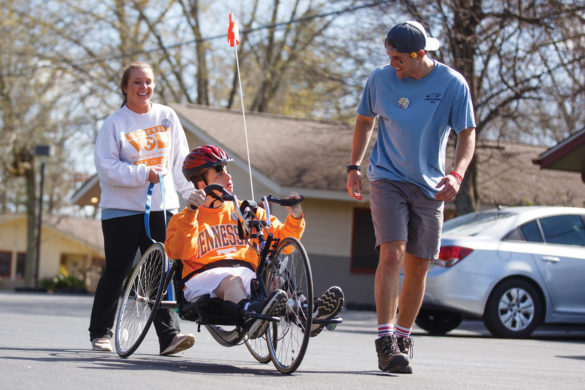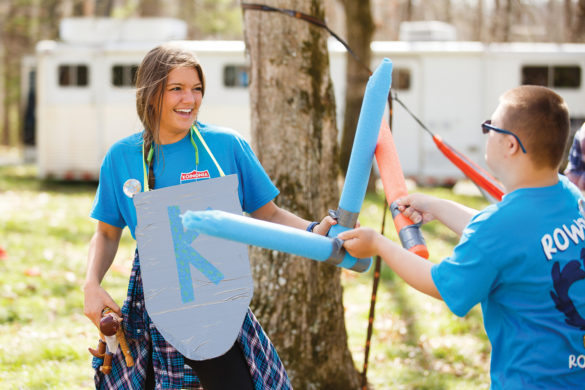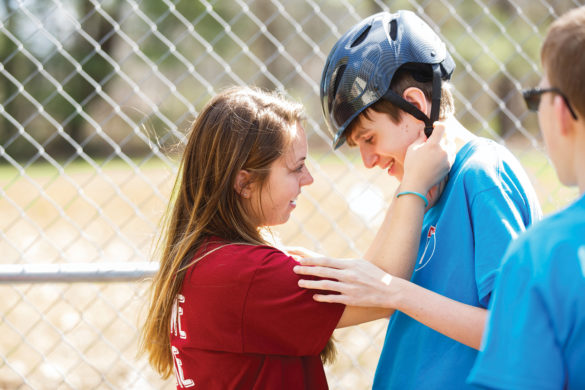Koinonia is a Greek word that means “fellowship” and “caring community.” Since it was founded in 1977, Camp Koinonia (pronounced KWAN-on-eea) in Crossville, Tennessee, has provided a weeklong experience for as many as 150 children ages seven through 21 who have various disabilities.
Campers enjoy activities like horseback riding, canoeing, arts and crafts, sports, music, and camping thanks to the help of some 200 UT students, many from the Therapeutic Recreation program. These students volunteer as counselors and learn practical lessons about meeting the needs of children with disabilities by being paired one-on-one with a camp attendee.
“It provides campers with a typical camp experience that they wouldn’t get otherwise,” says Haley Griffiths, assistant professor of practice in therapeutic recreation. “Parents tell us their kids get more excited for a week of camp than they do for Christmas.”
Working at Camp Koinonia gives therapeutic recreation students experience that they wouldn’t get anywhere else.
“It’s experiential learning,” says Angela Wozencroft, an associate professor and Camp Koinonia’s program director. “Our students are learning by doing and getting hands-on experience working with individuals with disabilities. It’s a special opportunity to apply the knowledge of their learning outside the classroom.
“That’s why we spend so much time doing team-building exercises, singing silly songs, studying disability, and then reflecting on the camp experience to truly learn the value of recreational therapy,” Wozencroft says.
And the experience has proven valuable once the students leave UT.
We’ve heard employers say to us, ‘I’d take a UT student over another student knowing the experience they’ve had.’”
Since the beginning of the pandemic, Camp Koinonia as a sleepover camp has been on hiatus. Last spring, Wozencroft, Griffiths, and their colleagues created a virtual version of the camp experience that included five videos of activities and camp songs that were shown over a four-week period to 500 special education students in Anderson, Blount, and Knox Counties.
For spring 2022, the staff is preparing several options, depending on the status of the pandemic. “Our hope is to do some version of an in-person camp,” says Wozencroft, “either as a day camp or back to the original sleepover model. We’ll plan both until we hit the point where we know we can do one way or the other. We hear older campers say ‘I miss camp.’ It’s sweet to hear.”
Camp Koinonia has always depended on the generosity of donors. “The support we receive from donors goes toward funding scholarships for campers whose families cannot afford the cost of attending camp,” says Wozencroft. “Gifts help ensure that no child is turned away due to inability to pay. Additionally, donations are used for special services that are needed at camp, such as nursing, and in the purchase of camp equipment and materials. Without the generous donations such as these, we would not be able to hold camp each year. We are extremely grateful for the philanthropic support of our alumni.”
Rachel Smith (’07, ’09) served as a Koinonia counselor for five years and wrote grant proposals for two years while working on her undergrad and graduate degrees. After UT, Smith earned her PhD in early therapeutic recreation at Indiana University and went to work for Tyson Foods in Arkansas, developing the talents and skills of its workforce. There Smith began Camp Acacia, based on the Koinonia model, and welcomed more than 100 campers.
At the same time, Smith and her family established the Camp Koinonia Internship Endowment at UT, supporting a paid internship for a graduate student working at the camp.
“The Koinonia experience really touched her,” says Wozencroft. “It was her passion, and it means the world to us that she continues to think of us.”
Emma Barnhardt Feick (’20), from Franklin, Tennessee, was a psychology major at UT when she dropped off her 16-year-old brother, Spencer, at Camp Koinonia in 2017.
“I had no clue what Koinonia was,” she remembers, “but seeing everybody there so excited to go to camp and seeing the impact it had on Spencer, I immediately changed my major to recreation and sport management with a concentration in therapeutic recreation because it was a better fit for what I wanted to do, which is to work with people with disabilities. I took the course to be a Koinonia counselor and worked there twice.”
Feick started her master’s degree in fall 2021 and is the recipient of the endowment established by the Smith family. She’ll be a co-director in the spring and do a lot of the behind-the-scenes work with planning. And she does it all for campers like her brother.
“Spencer has gone back every year since,” says Feick. “He talks about it all year long, always wondering who his counselor will be and if he’s going to see people he remembers there. That’s his place.”
—
Support the experience of a lifetime. Give to Camp Koinonia





